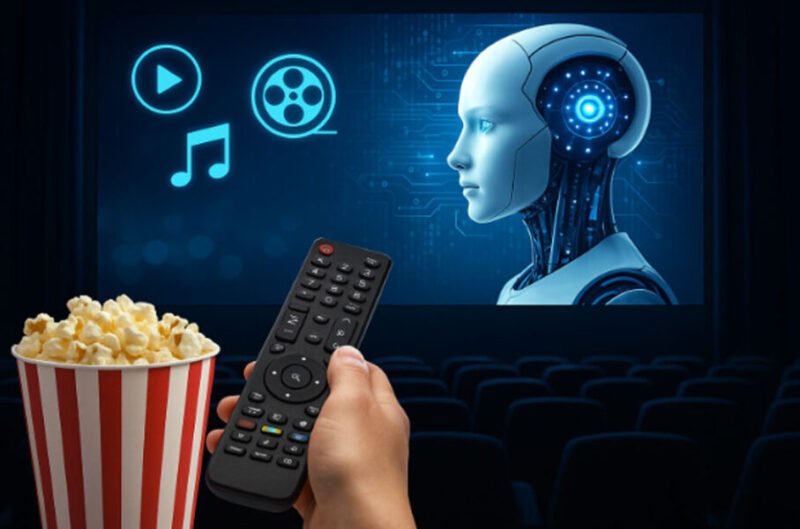If you’ve ever wondered how artificial intelligence could change your movie-watching experience, the answer might be closer than you think. Over the next five years, the entertainment industry is expected to evolve rapidly, blending creative storytelling with cutting-edge AI technologies. You may soon watch personalized films, see digital characters co-created by you, and even experience cinema in ways that adapt to your mood, interests, or culture.
This shift isn’t limited to high-end studios or massive productions. It’s a transformation that could influence how you engage with everyday entertainment, whether you’re streaming at home or exploring indie films on emerging platforms. AI entertainment is quickly redefining what it means to create, watch, and interact with movies.
AI’s Role in the Evolution of Film
Artificial intelligence has already made significant inroads into the creative world. From writing scripts and composing music to designing characters and enhancing post-production, AI tools are now part of many filmmaking workflows. But this is just the beginning. One notable trend shaping the future of entertainment is the use of Generative AI, which can create entirely new video content, voices, or visual styles based on minimal input.
For instance, composers and storytellers are experimenting with AI to generate background scores and lyrics. Japanese composer Yashushi Iwaki is among those who’ve explored how AI can help interpret the meanings of songs and tailor music to specific emotional arcs. Imagine movies in which the soundtrack isn’t fixed but adjusts based on your emotional response. With AI, that’s not far-fetched.
What Personalized Cinema Could Look Like
In the next five years, you may no longer be just a passive viewer. AI tools are paving the way for interactive and personalized movies that let you influence how the story unfolds. Want a romantic ending instead of a suspenseful twist? With the right AI setup, that could become an option.
This is where the concept of an AI movie generator becomes especially relevant. These tools use neural networks and trained models to generate plotlines, visual scenes, character arcs, and even dialogues based on prompts you provide. Mid-level creators and hobbyists are already using platforms like invideo AI, which combine visual asset libraries with the smart logic of an AI movie generator to help you create short-form or narrative content. Whether you’re creating a sci-fi sequence or a travel montage, these tools offer a framework that blends your ideas with AI-powered execution.
You might also notice a surge in applications that offer advanced video creation capabilities tailored for specific niches. For example, an AI video creator app can assist you in generating content for educational storytelling, product demonstrations, or interactive fiction, no Hollywood-level budget required.
Cultural Customization and Multilingual Narratives
Another likely shift involves how movies cater to global audiences. With the help of AI, scripts can be instantly translated and localized, not just word-for-word but with cultural nuance. This enhances your viewing experience and allows more authentic storytelling for diverse regions. AI doesn’t just translate the lyrics and meanings of songs; it helps ensure they resonate emotionally with different audiences.
This multilingual approach also means that future movie releases could debut globally in dozens of languages simultaneously, with AI-generated voices matching the tone and intent of the original actors. It’s a move toward inclusivity and accessibility that’s long overdue.
Ethical Considerations in AI Entertainment
As AI-generated content becomes more common, questions about ethics, originality, and creativity will become central to the conversation. You might find yourself asking: Who owns an AI-generated film? Is it the person who prompted it, the developer of the algorithm, or someone else entirely?
Moreover, creators and consumers alike will need to navigate the fine line between creative enhancement and over-automation. While it’s exciting to have tools that produce full scenes and scripts on command, the value of human imagination and emotional intelligence will remain critical. The goal isn’t to replace human storytelling but to amplify it with smarter, faster, and more responsive technologies.
What It Means for You as a Viewer or Creator
Whether you’re a movie enthusiast or a budding filmmaker, the next five years offer a window of opportunity to explore new formats. If you enjoy experimenting with content creation, AI tools are likely to become a regular part of your creative kit. From editing clips to building narratives, you’ll be able to produce visual stories with much more efficiency and flexibility.
For viewers, expect the lines between cinema, gaming, and interactive media to blur. You may soon be able to choose how long a movie runs, explore alternate endings, or receive film suggestions generated in real time based on your preferences and viewing history.
Final Thoughts
AI is already changing how you experience entertainment, and it will become even more immersive and interactive. As AI movie generator technology continues to advance and integrate into platforms like invideo AI, you’ll have more power than ever to both consume and create film content that feels deeply personal and culturally attuned.
Whether it’s through enhanced storytelling, intelligent music generation, or interactive visuals, AI entertainment is moving from novelty to norm. And in just five years, the movies you watch may be smarter, more responsive, and possibly co-created by you.








